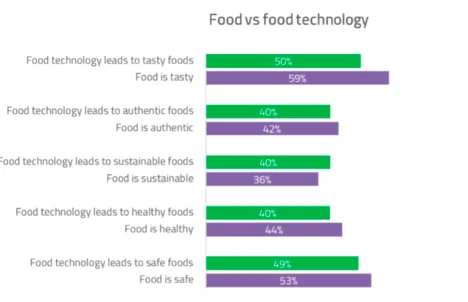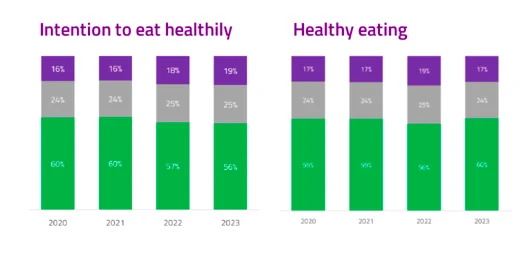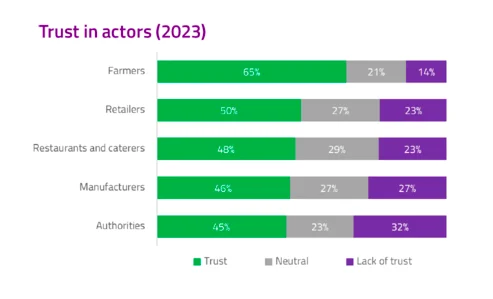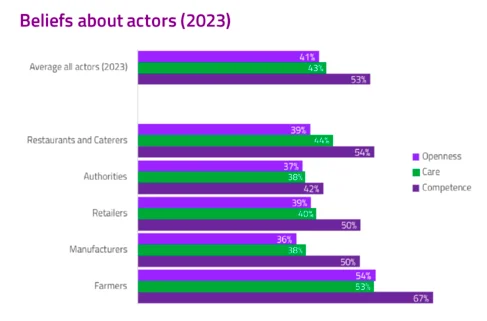The most recent EIT Food Trust Report reveals a concerning trend: a diminishing level of trust in food among Europeans, potentially influencing their decisions towards less healthy and sustainable food choices.
Key outcomes
1.Decline in Healthy and Sustainable Choices: The report indicates a worrying trend where fewer consumers are making healthy and sustainable food choices. This could be indicative of broader issues within the food sector, such as accessibility, affordability, or awareness of healthy and sustainable options.
2.Decreasing Trust: Trust in the food sector has declined, with less than half (45%) of European consumers expressing trust in the food they consume. This encompasses trust in aspects such as taste, safety, healthiness, authenticity, and sustainability.
The recent report by the European research hub, the EIT Food Consumer Observatory, highlights a concerning decline in trust within the European food system and a diminishing focus on sustainability among consumers. The study, which surveyed 19,624 individuals across 18 countries, reveals that less than half (45%) express trust in the various aspects of their food, such as taste, safety, health, authenticity, and sustainability, a marginal increase from the previous year’s 44%. Confidence in food technology is even lower at 43%.
While Europeans demonstrate slightly higher confidence in the safety (53%) and taste (59%) of their food, only 36% perceive it as sustainable, and 44% view it as healthy. The persistence of low trust levels in food and food technology over the years has been associated with a reluctance to explore new food options, with the introduction of innovative food choices receiving limited acceptance.

Courtesy: EIT Food
The intention to lead a sustainable lifestyle among Europeans decreased from 78% in 2020 to 71% in 2023, with a corresponding rise in the number of individuals (from 8% to 12%) who do not prioritize sustainability. In terms of dietary choices, fewer consumers (49%) prioritize the environmental impact of their food selections. This figure has decreased from 51% in 2020 and 2021, and 48% in 2022. Moreover, the inclination towards healthy eating habits has been diminishing over the past few years, with only 56% of consumers currently striving to eat healthily, compared to 60% in previous years.

Courtesy: EIT Food
The report underscores the need for enhanced consumer education to bridge the gap between intentions and actions regarding sustainable and healthy food choices. While there is a general understanding of what constitutes healthy food, defining sustainable food remains a challenge for Europeans. Individuals with lower education levels, no dietary restrictions, younger demographics, men, and those living alone show the least concern for sustainable and healthy diets.
The study also highlights a lack of trust in food innovation, as merely 34% of consumers express openness to novel food products. Notably, younger consumers exhibit greater receptiveness to food innovation, with 44% of individuals aged 18 to 34 expressing openness compared to 24% in the 55+ age group.This disparity suggests that the upcoming generation may be more amenable to embracing innovative food products aimed at fostering healthier and more sustainable dietary practices.Incorporating new products, ingredients, and technologies is vital for building a healthier and more sustainable food system. However, skepticism towards innovation persists, with a preference for traditional, natural, or organic methods over high-tech solutions. Despite the potential benefits of alternative protein sources, such as reduced environmental impact and improved health, only 27% of Europeans believe in their climate benefits.
Furthermore, the report underscores a decline in consumer trust towards various stakeholders in the food sector, including farmers, manufacturers, authorities, restaurants, and retailers.
While farmers remain the most trusted group within the food sector, with 65% of consumers expressing trust, there has been a slight decrease from the previous year. There is a notable lack of trust in other actors in the food system, including authorities (45%), manufacturers (46%), foodservice (48%), and retailers (50%). Concerns are raised regarding the competence and transparency of these actors within the food system.

Courtesy: EIT Food
Restaurants and caterers rank at 48% in terms of consumer trust, a reduction from the preceding year. Consumers acknowledge the competency of restaurants and catering services (54%), but express reservations regarding their commitment to public welfare.
The report further reveals that a mere 38% of consumers believe food manufacturers address public concerns adequately, while just 37% perceive them as transparent in their food production and distribution practices. Similarly, perceptions regarding authorities are under scrutiny, with slightly over a third of consumers questioning their responsiveness to public opinions on food-related matters (38%), and their transparency in regulating food production (37%).

Courtesy: EIT Food
The report highlights the significance of collaboration between the food industry and consumers to build trust, drive food innovations, and make informed decisions. Improving consumer awareness and engagement is crucial for developing a sustainable and inclusive food system amidst challenges like the impact of climate change on food production.Additionally, the report stresses the importance of establishing consumer trust regarding the health and environmental benefits of dietary choices. It is essential for the food sector to enhance information sharing, broaden options, and increase accessibility to promote healthy, environmentally-friendly, and affordable eating habits for everyone. This will lead to long-lasting changes in dietary behaviours.
Read the follow EIT report below

